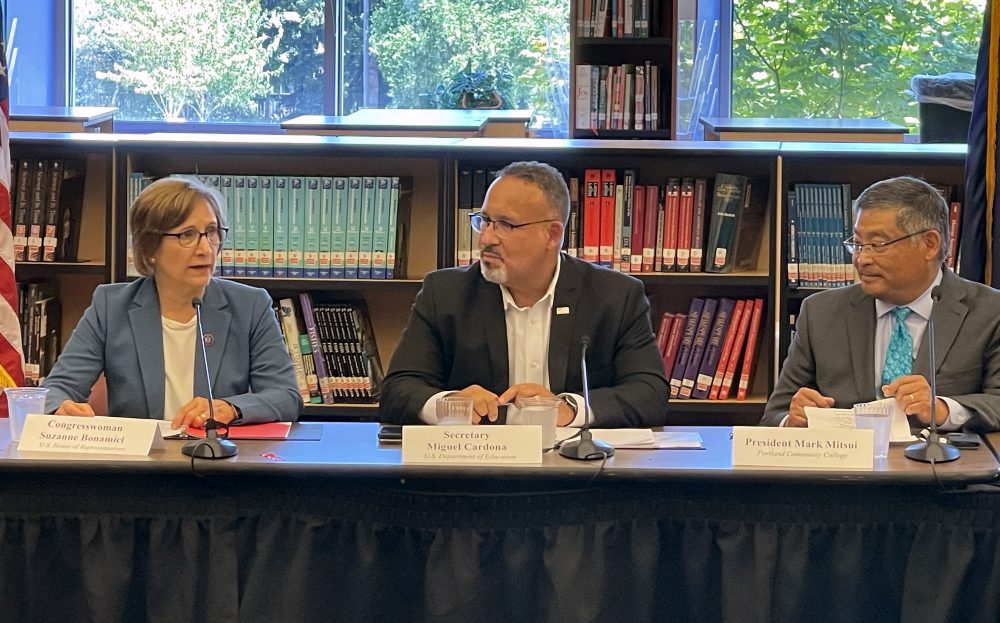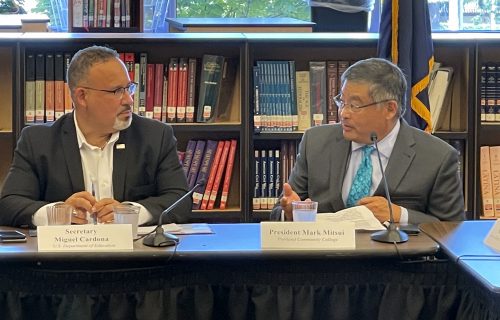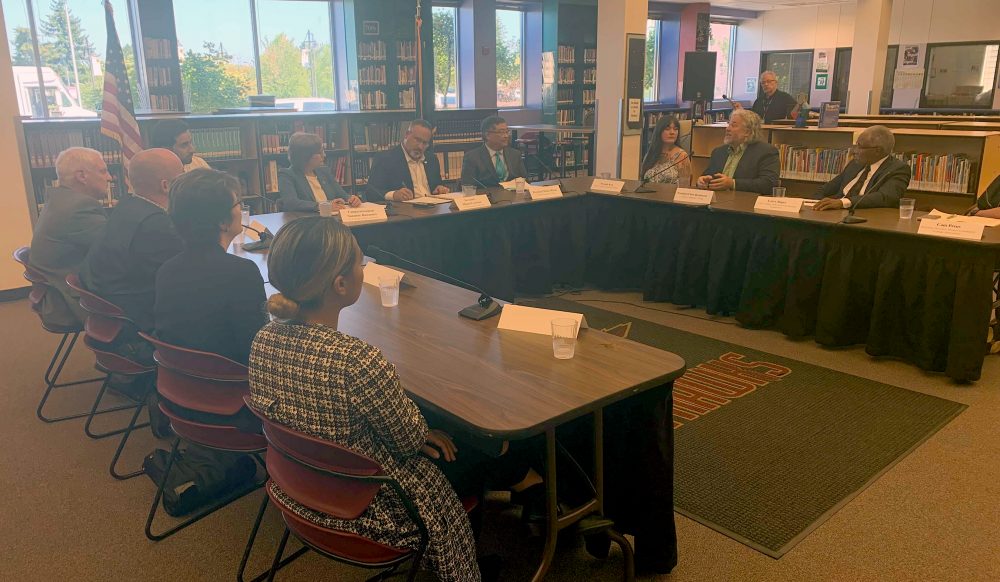This content was published: July 16, 2021. Phone numbers, email addresses, and other information may have changed.
President Mark Mitsui meets with U.S. Secretary Cardona, Rep. Bonamici
Story and Photos by James Hill and Abe Proctor.

Congresswoman Suzanne Bonamici and U.S. Secretary of Education Miguel Cardona discuss community college partnerships with Mark Mitsui.
This week, Portland Community College President Mark Mitsui took part in a roundtable discussion at Southridge High School in Beaverton with Congresswoman Suzanne Bonamici and U.S. Secretary of Education Miguel Cardona. Topics centered on providing students with pathways to affordable higher education and investments in education from the American Rescue Plan.
Congresswoman Bonamici, a community college graduate herself, hosted the roundtable with students and presidents of local community colleges. The attendees heard stories from students about the power of education to improve their lives, but also discussed how cost is often a barrier.
“The American Families Plan would help millions of students access two years of community college for free, which is a good investment in our students and our economy,” she said. “I look forward to working with Secretary Cardona and President Biden to make sure students and educators have the support they need to recover from the pandemic and build a better future.”
Before the pandemic, statewide surveys showed that most community college students reported some basic needs insecurity, meaning they were food and housing insecure, or even homeless. With the upheaval created by the COVID-19 pandemic, many PCC students have seen these issues exacerbated. They also faced a myriad of challenges when the college moved to remote operations, including needs related to technology and internet access in addition to housing insecurity, hunger, and/or unemployment.

Mitsui said that aid from the federal government, like that provided by the American Rescue Plan Act, is helping students stay in school.
To help address these issues, Congress passed three Acts appropriating funding to the Higher Education Emergency Relief Fund (HEERF), including funds to provide support for students in need. These bills were the Coronavirus Aid, Relief and Economic Security (CARES) Act, the Coronavirus Response and Relief Supplemental Appropriations (CRRSA) Act, and the American Rescue Plan (ARP) Act.
“We know that basic needs insecurity has been a fact of life for our students for a long time,” Mitsui told the roundtable. “COVID-19 has exacerbated the pressures that so many of our students had already been feeling. A recent study by the HOPE Center at Temple University shows that three-in-five college students are experiencing some form of basic needs insecurity during the pandemic. At two-year institutions like PCC, 39% of students are facing food insecurity, and 48% are facing housing insecurity.
“This is a question of basic needs, but it’s also a question of equity – the gap in basic needs insecurity between black students and white students is 16 percentage points,” he continued. “Aid from the federal government, like that provided by the American Rescue Plan Act, is not only helping our students to stay in school, in many cases it’s helping them to keep the lights on and food on the table.”
Secretary Cardona was sworn in as the 12th Secretary of Education in March. He previously served as the Commissioner of Education in Connecticut, where he faced the unprecedented challenge of responding to the COVID-19 pandemic and led the safe school reopening efforts in Connecticut. He began his career as an elementary teacher and has two decades of experience as a public school educator.
“What I heard here in Oregon is how the community colleges served as a safety net,” he said. “For me, this was a great example of how we want schools across the country to act when we have students that are in need. We were able to hear heavily from students and college leaders on the importance of building back better and what it really means. I’m excited about the opportunities to create pathways from high school to college to the workforce to four year schools.”

